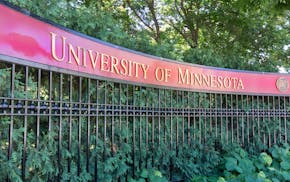NIMBY: "Not in my backyard," a pejorative acronym typically used to describe someone, or some group, who opposes development, or other changes, in their neighborhood for fear it may negatively alter their property values or sense of place. See also: residents of Mac-Groveland, Summit Hill or Highland Park.
The term NIMBY is a staple in the vocabulary of developers, city planners and neighborhood activists alike. And rightfully so, a lot of bad development has happened. In fact, it's all over the place. From our parking lots and Walgreen's to our ubiquitous single-family homes, strip malls and office parks, we've built a large grouping of places not worth caring about.
Our problem is that we've lost the ability to distinguish the difference between a good project and a bad project. In some neighborhoods, this happens at even the smallest of scales. Take for example a recent proposal by the Groveland Tap, a St. Paul neighborhood staple, to remove two on-street parking spaces and transform them into a sidewalk cafe (here's an example of a "parklet" cafe in San Francisco).
The local neighborhood group opposed it. Why? According to the reporting at TC Sidewalks, "allowing sidewalks seating area to expand could add to litter and late-night noise and the "safety of putting pedestrians closer to the street and traffic, and "that of precedent: 'if we allow this, we're going to have a hard time saying no to other requests.'"
There are a lot of holes in the neighborhood group's argument. None of the get to the heart of the matter: whose who have leadership roles in the neighborhood groups don't understand the desires of newer residents (what we're seeing here is similar to what is happening in Uptown). In the case of St. Paul, it's not the same group of young professionals as Uptown. It's more so the young professionals with families, or looking to have families, who still want to be able to walk to a pub, sit outside on a nice day and enjoy something decent on tap. They want an urban-neighborhood hybrid. Like their Uptown counterparts, they don't care as much as older generations about one thing that defines the urban generational gap: parking. Most in the younger generation and happy to bike, walk or park 4 blocks away and walk, in so much as the place is worth visiting.
This leads into the curious case of Cupake, the St. Paul-based upscale cupcake retailer. The successful University Avenue retailer was looking to expand on Grand Avenue. The problem: the City of St. Paul required 10 stalls. Cupcake only had 7. The City granted a variance, but the neighborhood group filed a lawsuit. There was some local political infighting and some back-and-forth, but at the end of the day, none of it mattered. Cupcake decided to abandon Grand Avenue for the Mall of America.
While it may be hard to endorse Cupcakes' move to the mall, it's easy to understand why it would abandon Grand Avenue. Cupcake needed what appeared to be a small variance, and it soon become a political football. What played out as over a half-dozen months of uncertainly and vanishing money could have easily of been avoided by one simple question: who cares about 3 parking spots?
We fail in our collective ability to be able to better distinguish the difference between the good and the bad. And while it may be reasonable for a neighborhood group to object to a five-story building in a residential neighborhood, why pick a battle against losing a few parking spaces in exchange for a sidewalk cafe and some cupcakes?
Those who have the leadership roles in the neighborhood groups don't understand the desires of newer residents, that's who cares. The neighborhoods surrounding Grand Ave are dense, walkable, have access to transit and run adjacent bike paths. Yet, three extra spaces were still needed? Apparently so. It'd be unfortunate for if those living along Summit, Portland and Lincoln, most all of whom have off-street detached garages, would have to have their occasional visitor inconvenienced by a locally-owned business potentially occupying a few extra parking spaces.
FYI: While it's easy to get your hands on a copy of The Villager if you live in St. Paul, it's nearly impossible to get neighborhood news if you don't live, well, in the neighborhood. The Villager is the best source for local news in St. Paul, but they aren't online. For that, you'll have to rely on the summaries at the TC Sidewalks blog (a great public service, by the way).

Teen suspect in Nudieland mass shooting arrested on murder, assault charges
'Human error' behind Robbinsdale shelter-in-place alert that was mistakenly sent countywide

Going to Wolves or Twins tonight? How to get there (and maybe avoid traffic).
Focusing on bringing football film into frame

